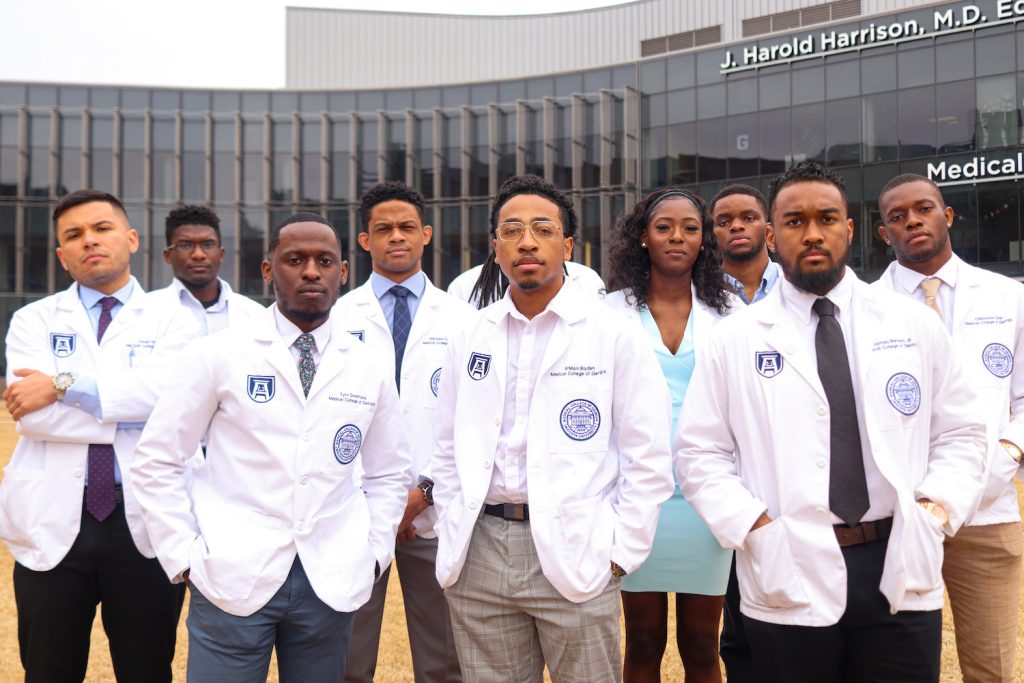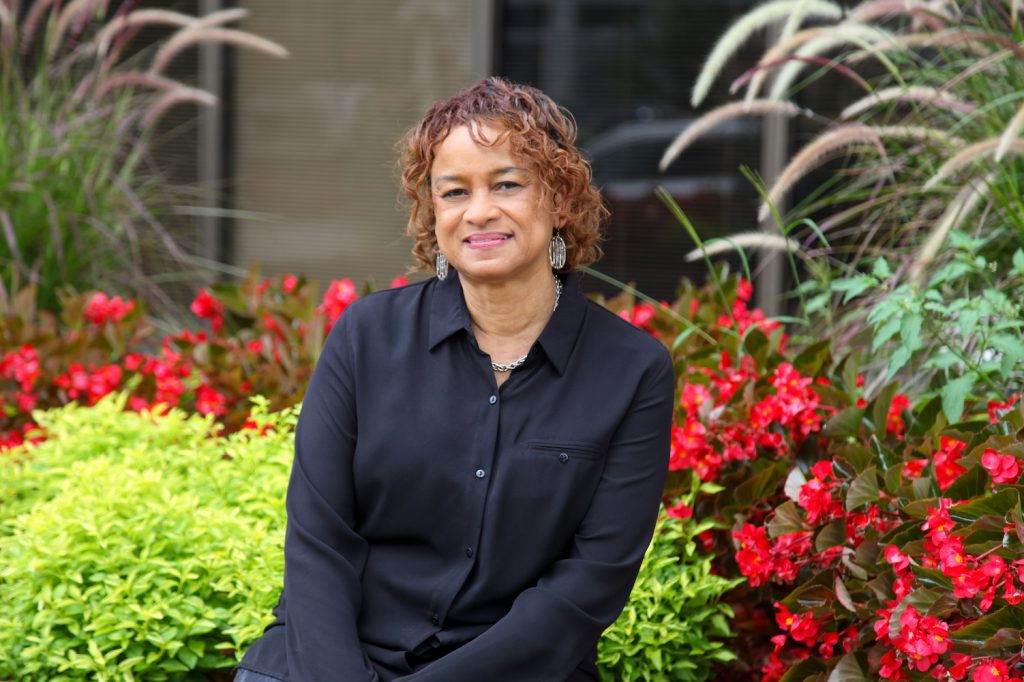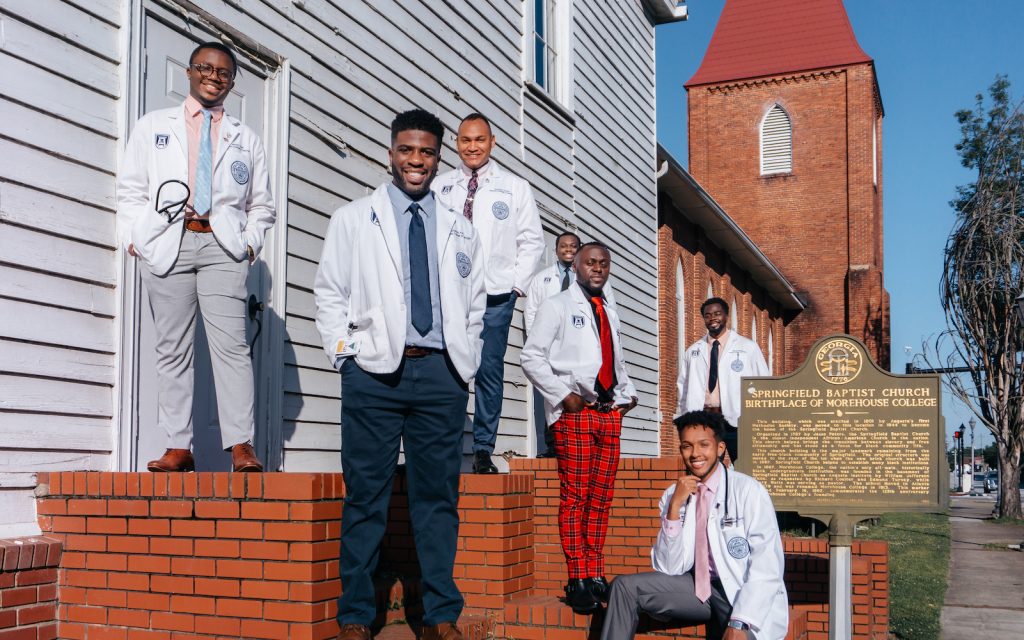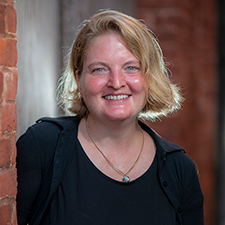In a few weeks, JaBreia James, a fourth-year medical student at the Medical College of Georgia, will stand next to her fellow soon-to-be graduates and find out where she will be matched for her residency.
While the Match Day celebration is one of the most memorable events at any medical school, James is also a little anxious to find out the location of her future residency program in the highly competitive field of dermatology.
“People are often surprised when they hear I’m an aspiring dermatologist because, to be honest, I have a very high likelihood of being the only Black person in my residency program,” James said. “Dermatology is the second least diverse specialty. The least diverse field is orthopedics. So, basically what that means is, as a minority going into dermatology, there are very few of us around.”
With such a diverse population of people living in the South, James said there is an enormous need for more minority medical students to consider the field of dermatology.
“In 2021, according to the Association of American Medical Colleges, I believe of the 1,300 current dermatology residents, only 5% identified as Black and 6% identified as Hispanic,” she said. “By 2044, minorities will make up over 50% of the U.S. Census. It is important that our physician workforce reflect our patient populations. Our patients from Black or Hispanic backgrounds are often ecstatic when they see their physician is also a person of color.”
Several months ago, James experienced such a connection with a patient while she was shadowing a local dermatologist. A young Black girl came into the office suffering from severe eczema.
“We were going through everything and talking about her eczema, and when it was over, the little girl came up and hugged me,” James said. “She smiled at me and said, ‘Wow. I’ve never had a Black physician before.’ That’s when I knew this is where I need to be.”
“I want little Black girls to see me and say, ‘You know what? She looks like me. Her hair is just like mine. Her skin is like mine. I could do this, too,’” James added. “My goal as a resident, no matter where I go, is to recruit more minorities to follow me. I want all little Black girls to see a Black dermatologist and think that is the norm.”
Despite making up 13% of the population in the United States, Black Americans are only 4% of physicians and less than 7% of recent medical school graduates. More alarming is the fact that the proportion of Black men in medical schools has actually dropped over the past 40 years, according to the Association of American Medical Colleges.
But last year, something changed. In 2021, applicants to medical schools across this country soared by a record-setting 17.8%, led by historical increases among underrepresented minorities, according to a recent report from the AAMC.
The first-year class of 2021 medical students is larger and more diverse than ever before. Among the more than 22,000 students who began medical school in 2021, those who identified themselves as Black or African American rose by 21% from 2020-21, followed by increases of 8.3% among Asian students and 7.1% among those of Hispanic, Latino or Spanish-origin students, the AAMC found.
“We are especially encouraged by the growth in applications and new enrollments by students in racial and ethnic groups that are underrepresented in medicine,” Dr. Geoffrey Young, the AAMC’s senior director of transforming the health care workforce, said in a press release last month.
Some factors believed to be fueling the rise of Black medical students include health care disparities that became more apparent during the COVID-19 pandemic, recent social injustices occurring across the country and changes in medical schools’ policies which eased fees and eliminated travel costs associated with applying, the AAMC reported.
The need for more diversity in medicine is crucial because research shows that patients who share a racial identity with their doctors accept more preventative treatments, show better awareness of their medical risks and adhere more closely over time to doctors’ instructions, according to a recent article called “Funding Equity in Health Workforce Development” published in the Stanford Social Innovation Review.
The article highlighted select medical schools, including the Medical College of Georgia at Augusta University, that are prioritizing diverse classes of doctors to focus on the needs of underserved communities.
“Before 2015, the four HBCU (Historically Black Colleges and Universities) medical schools were graduating more Black doctors than the next 10 schools combined,” the article states. “But the trend has shifted and 2019 was the first year where non-HBCUs graduated more than 90% of Black doctors, fueled by public universities such as the medical colleges at Augusta University in Georgia and University of Indiana.”
Dr. David Hess, dean of the Medical College of Georgia, understands the importance of a diverse institution and the impact such diversity can have on the future health of citizens across the state.
“Currently, Georgia’s population is about 32% African American and we would love to have 25% to 30% African American students at MCG to mirror the demographics of the state,” Hess said. “One of our major emphases and thrusts is to increase underrepresented minority scholarships here at MCG, and the MCG Foundation has been a big help in funding those scholarships.”
In 2017, MCG began following the holistic review recommendations developed by the AAMC as well as internal guidelines developed by the admissions committee, which is made up of 20 dedicated faculty members and students.
About 3,000 applicants apply to MCG each year and those applications are reviewed by the MCG admissions committee, which is composed of faculty, students and representatives from Augusta University’s regional campuses. Since the introduction of holistic review in 2017, Augusta University ranges anywhere from 16% to 26% African American and Hispanic students in each entering class at MCG.
This “holistic admissions process” assesses an applicant’s unique experiences alongside traditional measures of academic achievement, Hess said.
“No one thing ever gets a student into MCG,” Hess said. “But factors that we take into consideration are African American and Hispanic students and also students from south Georgia, because we don’t have as many students from south Georgia and that’s where the physician shortage is the most severe.”
Private companies are also helping with minority recruitment at Augusta University. Just this month, Chick-fil-A announced it has donated $100,000 to Augusta University to support two minority-driven initiatives. Half of the gift will help fund minority scholarships for medical students at the MCG and the other half will be used to help recruit more Black males to become educators through the College of Education.
“In conjunction with our mission, vision and values, Augusta University is working to create more career pathways for students, particularly underrepresented students who live in Georgia, that better reflect and serve our state demographics,” said Dr. Russell T. Keen, executive vice president for administration and chief of staff for the president at Augusta University. “We are grateful for this endorsement by Chick-fil-A.”

For 52 years, the Medical College of Georgia has offered a pre-college Student Educational Enrichment Program (SEEP) for current high school juniors and seniors enrolled in either the Richmond County or Columbia County school districts, as well as a college-level SEEP. Pre-college SEEP expanded to Savannah in 2012, and is open to high school juniors and seniors enrolled in the Chatham County School District.
The pre-college SEEP Augusta is a seven-week program, while SEEP Savannah is a six-week program, and there is no cost for students to participate. SEEP prepares students for a future career in the health professions through an extensive academic course.
SEEP College is a seven-week summer program with two levels. Each track helps prepare students for a future career in the health sciences, with an emphasis on medicine. The academic program includes an advanced biomedical science course; an upper-level critical thinking and clinical-based, problem-solving skills development component; and pre-professional and personal development.
Participants at these levels receive college credit for biomedical science courses offered in the program.
Linda James, the former assistant dean for Student Diversity and Inclusion at the Medical College of Georgia who retired last semester, said 70% of the SEEP alumni, which is more than 1,000 students, have matriculated into health professions programs, with about 50% of these entering medical schools throughout the country.
“SEEP started in 1970 as a diversity outreach recruitment initiative for the institution,” she explained. “It serves the same purpose today: To help to diversify the physician workforce and to recruit underrepresented medical students and students who come from disadvantaged backgrounds and rural regions of the state. It has been going strong for 52 years and I hope it will continue for another 52-plus years.”
James said this program has been her passion ever since she began as SEEP’s director almost 18 years ago.
“Diversity drives excellence in health care, and all individuals, regardless of their economic status or their social background, need good health care,” she said.
“Data shows that students who come from a particular background will generally go back and serve that same background. Therefore, health care providers of color typically go back and serve communities of color. The data also shows that students from rural regions of the state are more prone to go back and serve in a rural region. So, there is a significant need to recruit diverse medical students from across Georgia.”

The Medical College of Georgia has developed a 3+ Primary Care Pathway that will help place doctors where they are needed most in the state. This pathway shortens the traditional MD curriculum to three years instead of four and will provide free tuition or student loan forgiveness to students who commit to a primary care residency and agree to serve in an underserved area for three years.
With the 3+ Primary Care Pathway available to medical students, James said it’s vitally important to introduce students to health care professions at an early age.
“We’ve had approximately 2,300 students in the SEEP program,” she said, adding at least 300 students have participated in the SEEP programs at both the pre-college and college levels. “It’s so crucial to get them in the pipeline early and keep them in the pipeline, because the longer we keep them in the pipeline, the more opportunity we have to work with them to enhance their competitiveness and their preparedness for medical school or other health professional programs.”
Growing up in Savannah, Aderemi Awe wasn’t familiar with the Medical College of Georgia and had no idea that his future would lead him to Augusta University.
“The SEEP program actually brought me to MCG,” Awe said, smiling. “After my sophomore year at Mercer University, I was looking for something to build up my resume and I came across the SEEP program. And I’ll be the first to admit, initially, I wasn’t accepted into the program — but, fortunately, someone else dropped out and I was able to get that last spot.”
His experience in SEEP was life-changing, Awe said.
“I attended SEEP in 2018 and Mrs. Linda James, MCG and the SEEP program gave me the opportunity to really show why I deserve to be a medical student and, honestly, that’s just something I wouldn’t have gotten anywhere else,” Awe said, adding that he was involved in the intermediate SEEP program, which provides students with hands-on experience, introduces them to life as a resident and helps prepare them for the Medical College Admission Test (MCAT).
“I would just say for any minority student in the Augusta community, participating in SEEP is something I would definitely endorse. I probably wouldn’t be in medical school right now had it not been for SEEP.”
The support Awe received from SEEP also inspired him to get involved in another initiative on campus: Black Men of MCG.
Awe, along with MCG students Ryan Johnson, Sauveur Barry, Raymond Harris, Akwasi Aduboffour and Kenneth Queh, are the founding members of this student organization.
Black Men of MCG was established in January 2021 after the group realized Black male medical students needed a better sense of community at the university.
“With Black men making up only 3% of the medical field, I think it’s very important that we have the Black men that we have here now at MCG stay connected,” Awe said. “There are already so few Black physicians out there and I think it’s very important that we, as medical students, get exposed to the different fields in medicine. We can accomplish that goal through networking.”
Even before the COVID-19 pandemic, second-year MCG student Kenneth Queh said it was difficult interacting and meeting other medical students. But when the pandemic fully struck, Queh said many of Black medical students felt isolated.
“I remember talking to some upperclassmen, who were students of color, and asking them, ‘Hey, is there a community for African American males to be able to interact and support each other and meet here at MCG?’” Queh said. “They told me there was nothing like that here. And I think one thing that really spiked my interest to help develop this organization is that we lost several African American males within the first six months of 2021. It was alarming due to the fact that we already had a low number.”
Queh and Awe said they both knew there would be a lot of interest in students joining Black Men of MCG.
“We realized we needed to be able to find a way to hold each other accountable, support each other and go through medical school together,” Queh said. “I definitely think this is a tough journey, and while it’s rewarding at the end, we need to support one another along the way.”
Queh, who received his undergraduate degree at Georgia Southern University and earned his master’s degree from Duke University, said Black Men of MCG are not only supporting one another, but they are reaching out to the Black community to help spark student interest in the medical fields.
“We can’t expect more African American boys to want to be interested in medicine if they haven’t seen or heard anything about it,” Queh said. “So, we are going to middle and high schools and camps that have a high African American population and just talking to the students, giving them wisdom and letting them know that we are here and we need more African American physicians. We want to let them know they could be the next generation of African American medical students here at MCG.”
JaBreia James, who was also a part of SEEP’s intermediate program while she was an undergraduate student at Kennesaw State University, said the program helped prepare her for life as a medical student.
“There is no one else in my family who is a physician. I am the first to do it. So I just didn’t know what steps I should be doing and when I should be doing those steps in order to get into medical school,” she said. “I had a lot of questions like, ‘When do I need to take MCAT? How do I need to study for the MCAT?’ I just didn’t know.”
“It was actually a nurse I was shadowing at MCG who said, ‘I think the SEEP program would be very beneficial to you,’” she added. “And that’s what I’m most grateful for, because if you don’t know anyone in medicine, it’s very hard to get into medicine.”
As JaBreia James approaches her graduation in May, she can’t help but look back at all the hard work and tremendous dedication it has taken to get to this point in her life.
“I have been through the ringer,” she said, laughing. “Medical school is hard. It is very mentally taxing. I know I have come to the point at times where I’ve said, ‘I don’t think I can do this anymore.’”
At those times, JaBreia James turned to some of MCG’s minority faculty members such as Linda James for support and guidance.
“They have been able to look at me and say, ‘No, you’re not crazy. Yes, these things are happening. And here’s how you address it,’” JaBreia James said. “Having faculty members who look like you and who have done what you’re trying to do is absolutely crucial, and it helps us have a balanced curriculum. The truth is, medical schools need diversity in order to make better physicians for all people.”

Lister to our In the Wild podcast, where MCG trailblazers Drs. Joseph Hobbs and Ronald Spearman share their stories and their legacy of attending the Medical College of Georgia during desegregation.

